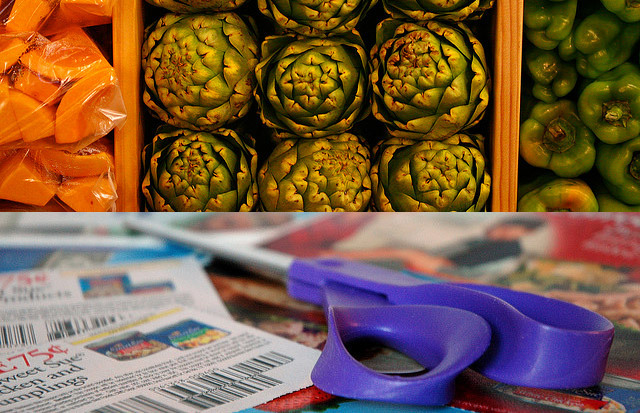Yes, You Can Use Grocery Coupons While Avoiding Junk Food

(liz west and Enid Martindale)
Clipping coupons can be a fun hobby and effective money-saving strategy, but a recent study shows that the coupons that come stuffed in your local paper are often for unhealthy or pre-made foods and brand-name products. Does this mean that coupons are completely useless if you don’t want to eat junk? No, not necessarily.
Coupons for whole foods (not Whole Foods) and healthier packaged foods do exist if you know where to look. It isn’t necessarily in the circulars from international food conglomerates that come in the Sunday paper. How do you do that? Here are some tips to save money on groceries without loading your cart up with chocolate frosted sugar bombs.
OBVIOUS THINGS
There are near-universal money-saving tips when it comes to food: cook your own meals from scratch. Eat whole pieces of fruit as snacks. Bake your own cookies. Check out discount grocers like Aldi (or Trader Joe’s, for slightly finer yuppie foods). Stock up when something you like to eat is on sale. Shop around the perimeter of the store where you find the essentials: produce, meat, dairy products, and beer.
It helps to have a general idea in the back of your head of how much a certain item costs at different stores so you can make comparisons, but that isn’t so important if you stick to only one store.
SHOPPER’S LITTLE HELPERS
You don’t have to do all the work of combing through local ads and rifling through coupons yourself. There’s an army of bargain bloggers out there who put together this information for their readers every week. Finding them is simple: simply type the name of your favorite grocery or discount store and the words “coupon matchups” in your favorite search engine. I live in the Northeast and shop at Price Chopper, for example, but also check the matchups for my local drugstores for interesting feats of couponing and loss leaders.
You might want to keep coupon inserts from the newspaper handy if you subscribe, but bloggers will also link directly to downloadable and printable coupons on matchup pages. (They often earn money from referrals when you click through and print out a coupon.)
Even if you benefit from coupon bloggers’ work and use their matchups, it’s a good idea to skim the produce and meat pages of your favorite store’s flyer either in print or online so you can look for interesting sales. You can’t really freeze lettuce, but you can plan your meals around what’s in season or on sale. Speaking of meat…
THERE’S A MEAT SEASON
If you eat meat and have a freezer, remember that there’s a meat season. Barbecue season, that is: most stores will hold sales for people holding backyard celebrations for Memorial Day, graduations, Independence Day, and just randomly during the season. No one says that you have to put this meat on your grill: stock up while it’s cheap and freeze it.
TREE-HUGGING HIPPIE BRANDS
If you shop at a health food store stick to the health-food section of the store due to dietary restrictions, food allergies, or personal preference, coupons exist for you, too. Here are two sites with coupons for common less-processed and allergy-friendly brands, some of which you can find in regular grocery stores:
Unfortunately, signing up for coupon sites may mean that you have to sign up for an account. It’s the price one must pay to get a dollar off vegan hot cocoa mix.
You can also check the sites and social media accounts of your favorite brands: they may offer printable manufacturer’s coupons that can be used at any retailer.
BEFRIEND YOUR FAVORITE STORES
You’re more likely to get coupons for staples like milk, meat, and even produce directly from the store–coupon circulars come from the manufacturers of packaged foods, after all. Exclusive coupons from your favorite stores come in e-mail newsletters. Relegate these to a special e-mail folder (or let Gmail do it for you) if you prefer. Some stores also offer special deals to their Facebook followers.
REMEMBER THE BIG PICTURE
Coupons aren’t all about food. Don’t forget that if you use coupons and/or shop sales for other household staples like garbage bags, toilet paper, detergent, or paper towels, you can put that money back in your food budget.
Want more consumer news? Visit our parent organization, Consumer Reports, for the latest on scams, recalls, and other consumer issues.

